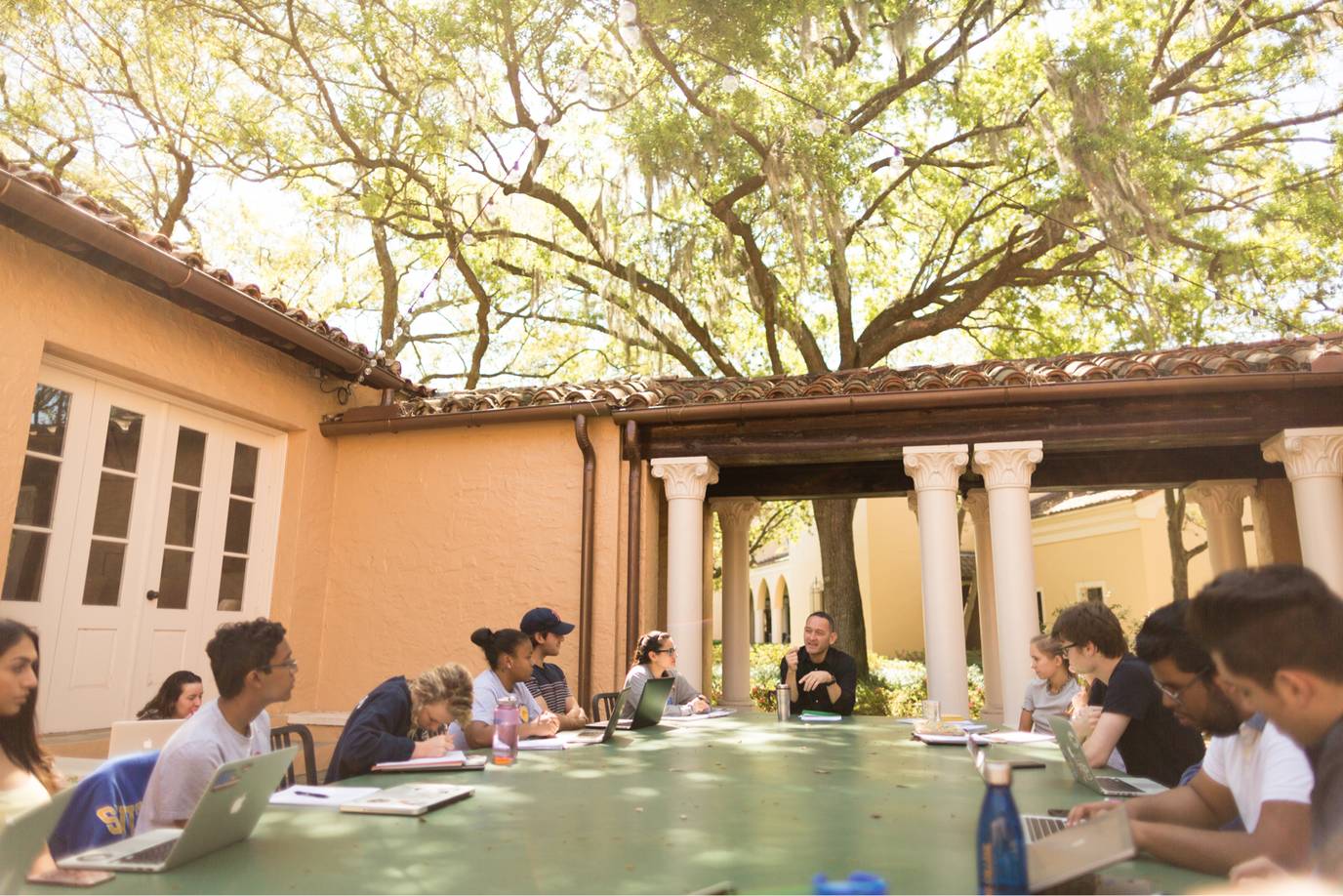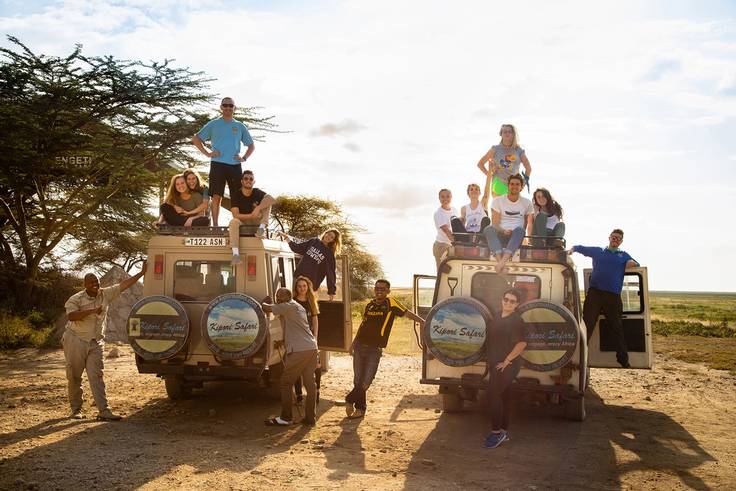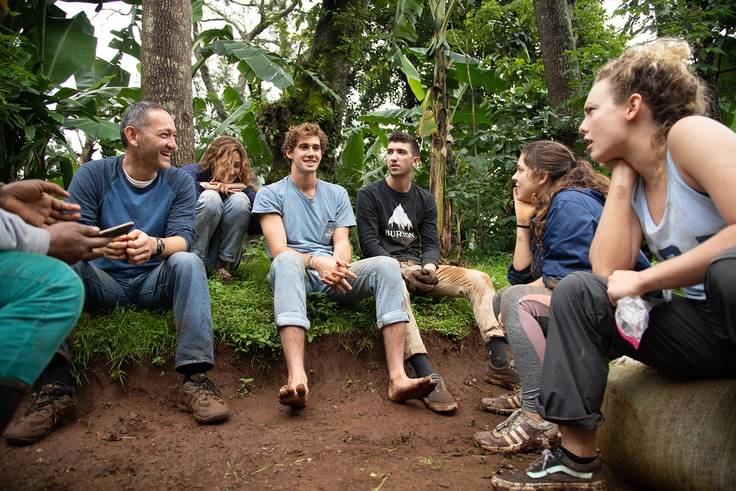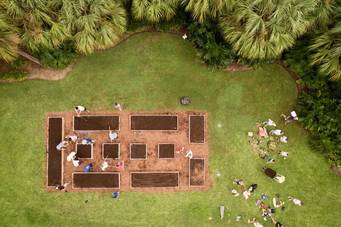Change Agent
October 24, 2017
By Rob Humphreys ’16MBA

Rollins political science and international relations professor Dan Chong is dedicated to helping his students see the world differently.
Dan Chong doesn’t have anything against the classroom. After all, he does great work there. But it’s tough to replicate the experience of tending to HIV patients in South Africa or collaborating with social entrepreneurs on humanitarian missions to the Caribbean.
Perhaps that’s why the political science professor is among the College’s most prolific leaders of faculty-led field studies. During his nine years at Rollins, Chong has led students everywhere from Cuba and the Dominican Republic to Guatemala and Thailand. This summer, he led 13 students to the base of Mount Kilimanjaro in Tanzania, where they helped construct a kitchen and bathroom for Better Lives development coordinator Sam Barns ’11 ’12MBA’s eco-lodge project.
An Arthur Vining Davis fellow, faculty advisor of the Amnesty International club, and chair of the College’s Internationalization Committee, Chong brings a strong global perspective to his new role as faculty director of Rollins’ Social Innovation and Entrepreneurship Hub. Here’s how he became an evangelist, so to speak, for experiential, service learning.

You grew up wanting to be a missionary or pastor. And in college you majored in Bible studies and psychology. How did you end up teaching political science at a liberal arts college? “I became a professor because, when I was in college, being in a classroom literally changed my life. That’s not hyperbole. I grew up in a devout religious environment, and the college classroom was the first time I seriously asked myself two crucial questions: Why do I believe what I believe? And why is the world the way it is? Those two questions started me on a journey that ultimately upended my worldview and my life path. My college experience was about critical thinking, self-discovery, and exposure to ideas and injustices and possibilities I had never fathomed.”
Describe how your academic passion has come to lie “at the intersection of human rights and global poverty. “I gained that passion by working in a refugee camp in Thailand when I was 21. That experience made me change my direction and want to work with human rights and global policy issues like war and peace, poverty, and basic questions about how to make life better for the billion people at the bottom of the world’s pyramid. I went on to work with public policy groups in Washington, D.C., a homeless shelter in Indiana, and organizations like Catholic Relief Services and Save the Children.”

How does teaching at Rollins complement the humanitarian side of your calling? “Rollins’ commitment to global citizenship allows me to bring similar experiences to my students ... to craft global citizenship into a tangible, concrete thing. The classroom is great, but you can only learn so much in there. It’s different when you meet political prisoners who’ve been tortured for 10 years. It’s different when you sit with a patient in a South African clinic who discovers that they will actually get treatment for their HIV. Rollins allows me to share these kinds of transformational learning experiences with my students, and I’m grateful for the opportunity.”
What part of the world has impacted you the most? “The Thai-Burma border. I’ve taken students on three trips there to work with Burmese refugees and political exiles. One place we’ve visited is a trash dump where about 100 families live. They make a living recycling plastic, and their houses are makeshift bamboo and rags. They have no clean water or sanitation, and they get medical care through a clinic that’s paid for by the U.S. government and private charity. They get water through the Japanese government, and they’re able to make money through a farm and restaurant a Buddhist monk helped set up. I’ve been around the world a lot, and it was the toughest thing I’ve ever seen—the smells, the buzzards, the kids walking around all that trash.”
What’s something most people might not know about you? “When I was in high school, I was a mime. I’d go with my church youth group and perform these mime acts and do street preaching when I was like 13 or 14. I’ve had a lot of unique jobs, too. In college, I was a psych tech at a mental hospital for patients with multiple personality disorder. And when I worked at the homeless shelter, my main job was to go around town and find places where people were living and get them access to services. My colleague and I would go to abandoned buildings—he’d do basic health checks and I’d do mental health checks.”

A Campus Committed to Change
Rollins is one of just 42 colleges in the world to earn Ashoka U’s Changemaker Campus designation, which recognizes the leading institutions in social innovation and changemaking.
Read More
April 17, 2024
Makayle Kellison ’24 Earns Goldwater Scholarship
Makayle Kellison ’24 has earned a Goldwater Scholarship, the country’s most prestigious undergraduate scholarship for the STEM fields.
April 11, 2024
Structured Support
With myriad resources and services, you’ll receive a strong foundation at Rollins on which to build your dreams.
April 03, 2024
What It’s Like to Be a Rollins Student-Athlete
Rollins’ winning combination of academic and athletic excellence empowers student-athletes like Ben Kopen ’24 to thrive both on and off the field.
